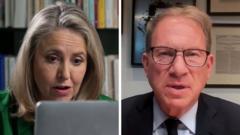After exposing how senior Trump administration officials mistakenly shared sensitive military planning details in a Signal chat, journalist Jeffrey Goldberg is now the target of public attacks from government officials. The situation raises questions about accountability and information security in governmental operations.
Journalist Caught in Signal Chat Scandal Faces White House Backlash

Journalist Caught in Signal Chat Scandal Faces White House Backlash
Jeffrey Goldberg's revealing article about a Signal chat leak involving top Trump officials has led to a barrage of insults and accusations from the administration.
Amidst political turmoil, The Atlantic editor Jeffrey Goldberg has found himself at the center of controversy after publishing a revealing article about his unexpected inclusion in a Signal chat with top Trump administration officials. What began as an unusual invitation to join discussions among cabinet members—such as Secretary of State Marco Rubio and Secretary of Defense Pete Hegseth—quickly spiraled into a public relations crisis for both Goldberg and the White House.
Goldberg's article shed light on sensitive strategic details surrounding a military operation targeting Houthi rebel positions in Yemen. The fallout has been swift; President Trump publicly degraded Goldberg, labeling him a "sleazebag," while National Security Advisor Michael Waltz accused the journalist of deception, despite being the one who mistakenly invited him into the chat.
In an exclusive interview, Goldberg recounted the moment he received a message through the popular encrypted messaging app, Signal. Initially suspecting it could be a hoax, he later found himself privy to discussions about the military plans in a chat room he was not meant to be a part of. "I wish there was a Le Carré quality here... But he asked me to talk. Next thing I know, I'm in this very strange chat group with the national security leadership of the United States," Goldberg shared.
In the wake of Goldberg's article, which initially summarized the leak, the Atlantic published full text messages detailing precise military timings and target information. While some Trump officials dismissed the content as trivial, claiming no sensitive secrets were released, Goldberg firmly disagrees. He argued that sharing even the logistical specifics of an operation amounted to a breach of security protocols.
The White House has since rallied around Waltz, even seeking tech magnate Elon Musk's help in investigating how Goldberg's contact information got into the chat. This move was met with skepticism by Goldberg, who remarked, "Most 8-year-olds could figure it out."
With criticisms mounting over the accountability of top officials, Goldberg left the chat, opting not to engage further with the sensitive discussions. "If you're an Air Force captain or CIA operative who mishandled sensitive information, you'd be fired," he noted, implying a double standard for political leaders.
As the White House grapples with the implications of the incident, questions loom over national security practices, accountability, and the limits of journalistic access. Despite receiving major backlash, Goldberg remains resolute, maintaining that the truth must prevail amidst the chaos surrounding the Signal chat leak.






















